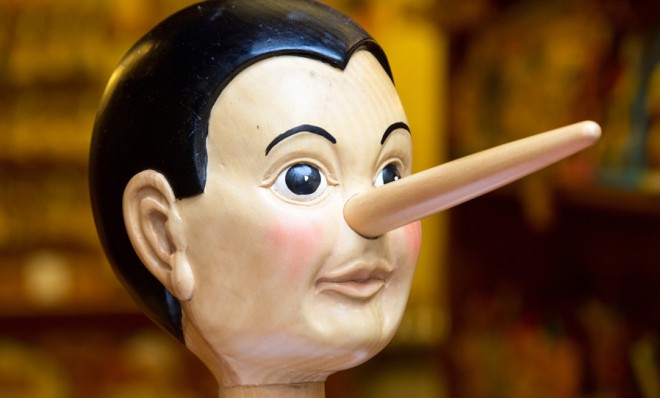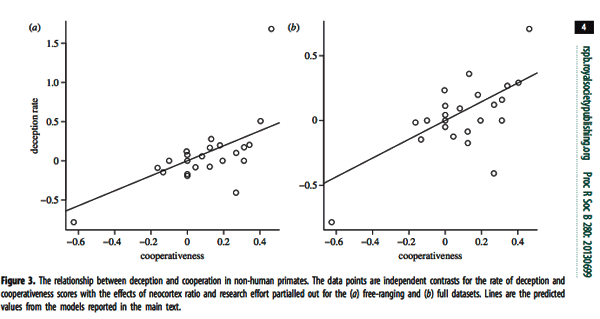Why do we lie? A look at the evolution of mendacity
Turns out that fibbing could be the key to the human race's survival

A free daily email with the biggest news stories of the day – and the best features from TheWeek.com
You are now subscribed
Your newsletter sign-up was successful
The answer to the question "Why do we lie?" seems fairly obvious: The truth is messy, inconvenient, and a time-consuming pain to untangle. Hence, the existence of little white lies: "I'm on my way!" when really you're still brushing your teeth.
It turns out that there's scientific evidence to back that theory. A new study published in the Proceedings of the Royal Society B looks at the phenomenon of lying through an evolutionary lens, and the research suggests that lying has helped grease the wheels of human interactions for ages.
"Tactical deception," claim the study's authors, "[or] the misrepresentation of the state of the world to another individual, may allow cheaters to exploit conditional cooperation."
The Week
Escape your echo chamber. Get the facts behind the news, plus analysis from multiple perspectives.

Sign up for The Week's Free Newsletters
From our morning news briefing to a weekly Good News Newsletter, get the best of The Week delivered directly to your inbox.
From our morning news briefing to a weekly Good News Newsletter, get the best of The Week delivered directly to your inbox.
Cooperation, after all, is one of those feel-good characteristics that truly defines us. It might even explain why so few of us are left-handed. Working together lets humble humans accomplish great things, from building skyscrapers to mapping the neural circuitry of the human brain.
"We might take cooperation as an obvious facet of life, but long-term cooperative gain requires a willingness to put aside narrow self-interest in the short term," writes Rob Brooks at PhysOrg. "And that doesn't evolve easily."
In most societies — including those of ants, bees, dolphins, and apes — cooperative behavior is rewarded. (You get to eat, yay!) On the other hand, individuals caught deviating from the group to pursue their own interests are punished. Nature has all sorts of mechanisms to make sure everyone falls into line.
That's why lying as an act of self-preservation may be important to sustaining a complex, nuanced society built on relationships. More specifically, co-authors Luke McNally and Andrew L. Jackson of Trinity College in Dublin found that lying was a tactic employed by apes and monkeys whenever a high level of cooperative behavior was necessary. As this chart demonstrates, the two are correlated — the more cooperative a group of primates are, the higher the likelihood a lie will be told:
A free daily email with the biggest news stories of the day – and the best features from TheWeek.com

As the Daily Mail has it, mischaracterizing the truth allows individuals to "form coalitions, get food, and mate." It happens in nature all the time. Deception "occurs in some spiders where males give worthless nuptial gifts to potential mates," McNally tells the Daily Mail. "It can occur in bacteria where they over-produce signals to elicit co-operation from others."
Think of how we use tiny lies every day to our advantage. We use untruthful language to flatter, gain the trust of comrades, and make ourselves more attractive to prospective bosses, not to mention potential mates. (For your consideration: Dating profiles.) More often than not, we lie to find others to align ourselves with.
"Ultimately," write the study's authors, "this most Machiavellian element of human behavior may be the product of one of our most beneficent characteristics — our tendency to seek mutually cooperative relationships."
-
 Switzerland could vote to cap its population
Switzerland could vote to cap its populationUnder the Radar Swiss People’s Party proposes referendum on radical anti-immigration measure to limit residents to 10 million
-
 Political cartoons for February 15
Political cartoons for February 15Cartoons Sunday's political cartoons include political ventriloquism, Europe in the middle, and more
-
 The broken water companies failing England and Wales
The broken water companies failing England and WalesExplainer With rising bills, deteriorating river health and a lack of investment, regulators face an uphill battle to stabilise the industry